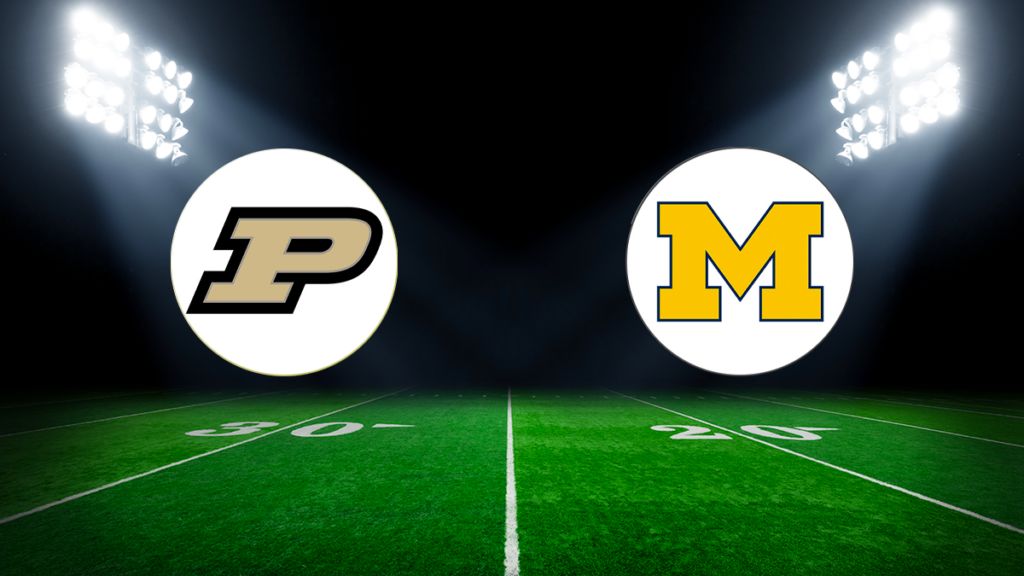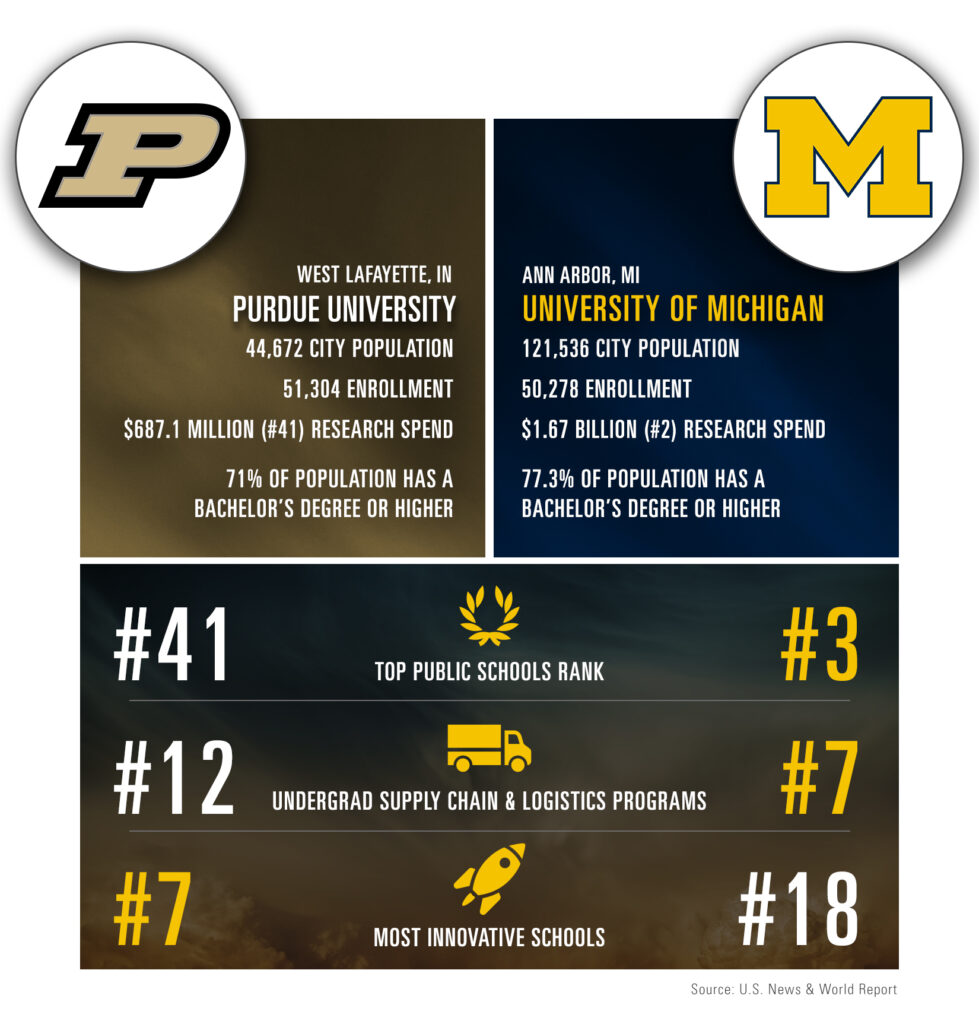
Week 14: Saturday, December 3, 2022 | Michigan vs. Purdue| Lucas Oil Stadium | 8:00pm EST
Ann Arbor SPARK’s popular football blog series is back for Michigan’s 143rd season! We use the football season as an opportunity to compare Ann Arbor to cities around the country represented by our U-M football competition. The question is always – how does Ann Arbor compare to other college towns in the U.S.?
THE game was played last weekend and Michigan secured yet another Big Ten East Division title with a big win against rival Ohio State for the second year in a row. The Wolverines dominated the Buckeyes in the second half of the game, resulting in a 45-23 win at the Shoe in Columbus. Before last weekend’s game, Michigan had not beaten Ohio State in Columbus since 2000. Both teams were undefeated (11-0) heading into the matchup, but only Michigan moves forward into the championship game with an impressive 12-0 record.
This weekend, the No. 2 ranked Michigan team heads to Lucas Oil Stadium in Indianapolis to take on Purdue in the Big Ten Championship Game. The two teams have not played each other since 2017 (Michigan won 28-10), but Purdue will be bringing some big late-season winning energy into the game as it marks their first appearance in a Big Ten title game. Purdue comes into the game with three consecutive wins in the final weeks of the regular season, resulting in a record of 8-4.
Moving on to how our two regions compare, this week we are looking at the home of the Purdue Boilermakers, West Lafayette, Indiana.
- West Lafayette is about a third the size of Ann Arbor in terms of population, but Tippecanoe County, as a whole, is very similar in size.
- Interestingly, Purdue’s enrollment is larger than the total population of the town. Purdue has just over 51,000 students enrolled while West Lafayette only has 44,672 residents.
- Both areas benefit from high educational attainment (more than 71 percent of the population possesses at least a bachelor’s degree).
- Both regions have a low unemployment rate (3.3 percent in Ann Arbor and two percent in West Lafayette).
- The cost of living in Lafayette is lower than in Ann Arbor (92.2 and 100.4, respectively) and, similarly, so is the median household income ($51,926 and $75,730, respectively).

The spirit of innovation is deeply rooted in both communities. Similar to Michigan’s North Campus Research Complex, West Lafayette and Purdue University have collaboratively built the 650-acre Purdue Research Park. Established in 1961, it is home to more than 100 high-tech companies with 2,500 employees and offers state-of-the-art communications infrastructure, research facilities, a business incubation complex to help startup firms, and scenic walking trails and lakes. It is billed as “the largest university-affiliated incubation complex in the country” and the research park uses the slogan, “the idea economy is here.”
Fun fact: Tippecanoe is pronounced ti·puh·kuh·noo and guarantees a smile if you say it out loud. According to Indiana Connection, Tippecanoe is easily the most poetic and fun-to-say county in the state of Indiana, but its meaning has nothing to do with capsizing a boat. Tippecanoe is the anglicized word for a Miami Indian term meaning “place of the succor fish people” — because succor (also known as buffalo fish) were abundant in the waters in the area.
Want more regional comparisons? Check out our annual benchmarking report to see how Ann Arbor stacks up against a competitive set of technology-driven communities and their economies.
We’re into the post-season comparisons! Be sure to tag us when you share these interesting tidbits with your friends via social media! And, if you want more information like this or are curious to learn more about the Ann Arbor region and what makes it such a great place to live, work, and locate your business in, please reach out to our Director of Research, Melissa Sheldon.
In case you missed it, here are links to the regional comparisons we’ve posted so far this year:
- Week 1: Ann Arbor vs. Fort Collins
- Week 2: Ann Arbor vs. Honolulu
- Week 3: Ann Arbor vs. Storrs Mansfield
- Week 4: Ann Arbor vs. College Park
- Week 5: Ann Arbor vs. Iowa City
- Week 6: Ann Arbor vs. Bloomington
- Week 7: Ann Arbor vs. State College
- Week 8: Bye Week
- Week 9: Ann Arbor vs. East Lansing
- Week 10: Ann Arbor vs. New Brunswick
- Week 11: Ann Arbor vs. Lincoln
- Week 12: Ann Arbor vs. Urbana-Champaign
- Week 13: Ann Arbor vs. Columbus
Sources
Where do we get our numbers? And what do they mean?
- Population data comes from the U.S. Census, 2021 Population Estimates. Check out Ann Arbor’s data.
- Enrollment data comes from the Integrated Postsecondary Education Data System (IPEDS). Review University of Michigan data.
- Research expenditure data comes from the National Science Foundation. View the Rankings by Total R&D Expenditures.
- Educational attainment data comes from the US Census 2016-2020 American Community Survey Five-Year Estimates. We look specifically at the population over the age of 25, and the highest level attained. Check out Ann Arbor’s data.
- The rankings come from U.S. News and World Report unless otherwise noted.